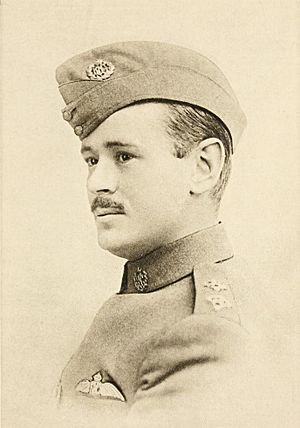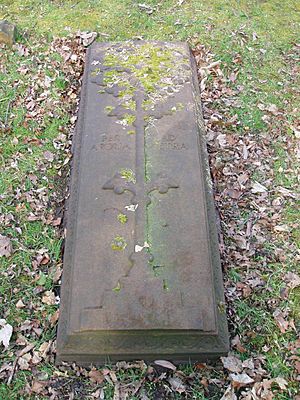Arthur Lewis Jenkins facts for kids
Arthur Lewis Jenkins (born 1892, died 1917) was a British soldier, pilot, and war poet. He wrote poems about his experiences during World War I.
Early Life
Arthur Lewis Jenkins was born on March 9, 1892, in Barton Regis, near Bristol, England. His father, Sir John Lewis Jenkins, was an important government official in India. His mother was Florence Mildred Trevor.
Arthur went to Packwood Haugh School and then Marlborough College from 1905 to 1911. At Marlborough, he was the head boy. He also played rugby and was part of the Officers' Training Corps, which prepared students for military service. Later, he studied at Balliol College, Oxford.
His family lived in Devon, and after his father passed away, they moved to Kew, Surrey.
Military Career
Arthur was expected to work for the government in India, but he decided to join the army instead. In September 1914, he became a Second-Lieutenant in the Duke of Cornwall's Light Infantry.
He served in different places, including India, Aden (where he led a machine-gun team), and Egypt. In May 1917, he joined the Royal Flying Corps as a Lieutenant. He trained to become a pilot in Egypt.
In August 1917, he was sent back to England to train for night flying. Sadly, he was killed during a night flying duty on December 31, 1917, in Helperby, Yorkshire.
Poetry
Arthur Lewis Jenkins started writing poems while he was at Marlborough College. His poems were published in the school magazine. Later, his work appeared in famous magazines like Punch and The Westminster Gazette.
One of his poems, 'Arabia,' describes his time campaigning in Aden. It was published in Punch. Another poem, 'The Inn of the Sword,' is a mysterious story about a challenge. His poem 'Happy Warriors' was in The Westminster Gazette, and 'Sending' was in "The Children's Story of the War."
After he died, a collection of his poems called "Forlorn Adventures and other poems” was published in 1918. His poems were also included in books of World War I poetry, such as "The Muse in Arms".
The famous writer Virginia Woolf reviewed his poems. She said he was "a poet and a sportsman who loved the wind and the sea."
Happy Warriors
This poem honors soldiers who died bravely in war.
Clear came the call; they leapt to arms and died,
As in old days the heroes prayed to do;
Great though our sorrow, greater yet our pride,
O, gallant hearts in you.
Surely they sleep content, our valiant dead,
Fallen untimely in the savage strife:
They have but followed whither duty led,
To find a fuller life.
Who, then, are we to grudge the bitter price
Of this our land inviolate through the years,
Or mar the splendour of their sacrifice
That is too high for tears....
God grant we fail not at the test—that when
We take, mayhap, our places in the fray,
Come life, come death, we quit ourselves like men,
The peers of such as they.
Arabia
This poem describes the harsh but also beautiful landscape of Arabia, where Arthur served.
An aching glare, a heat that kills,
Skies hard and pitiless overhead,
And, ever mastering lesser ills,
Sad bugles keening comrades dead;
Fever and dust and smiting sun,
In sooth a land of little ease;
Yet now my service here is done
I think on other things than these.
Dawn on the desert's shortlived dew,
Blue shadows on the silver sand,
Grey shimmering mists that still renew
The magic of the hinterland;
Sunsets ablaze with crimson fire,
Pale moons like plates of beaten gold,
Soft nights that fevered limbs desire,
And stars whereto our stars are cold;
Sharp rattling fights at peep of day,
Machine-guns searching scrub and plain,
Red lances questing for the prey,
And shrapnel puffs that melt again;
Swift shifting stroke and counterstroke,
Advance unhurrying and sure,
Until the stubborn foeman broke—
These are the memories that endure.
Heigh-ho! I would not stay - and yet,
Now that the trooper's fairly in,
With vain unreasoning regret
I turn my journey to begin;
For through the haze of dust and heat
That veils the desert and the town,
Still glimmers something strange and sweet,
The afterglow of old renown.
Memorials
Arthur Lewis Jenkins had a military funeral. He is buried in Richmond Cemetery next to his sister, Elinor May Jenkins, who was also a war poet. The words on his grave are "Per ardua ad astra," which means "Through hardship to the stars."
He is also remembered on memorials at Marlborough College, Balliol College, Packwood Haugh School, and St Anne's Church, Kew.
See Also
- Biographical note in For remembrance: soldier poets who have fallen in the war (1920) by A. St. John Adcock.
 | Lonnie Johnson |
 | Granville Woods |
 | Lewis Howard Latimer |
 | James West |



